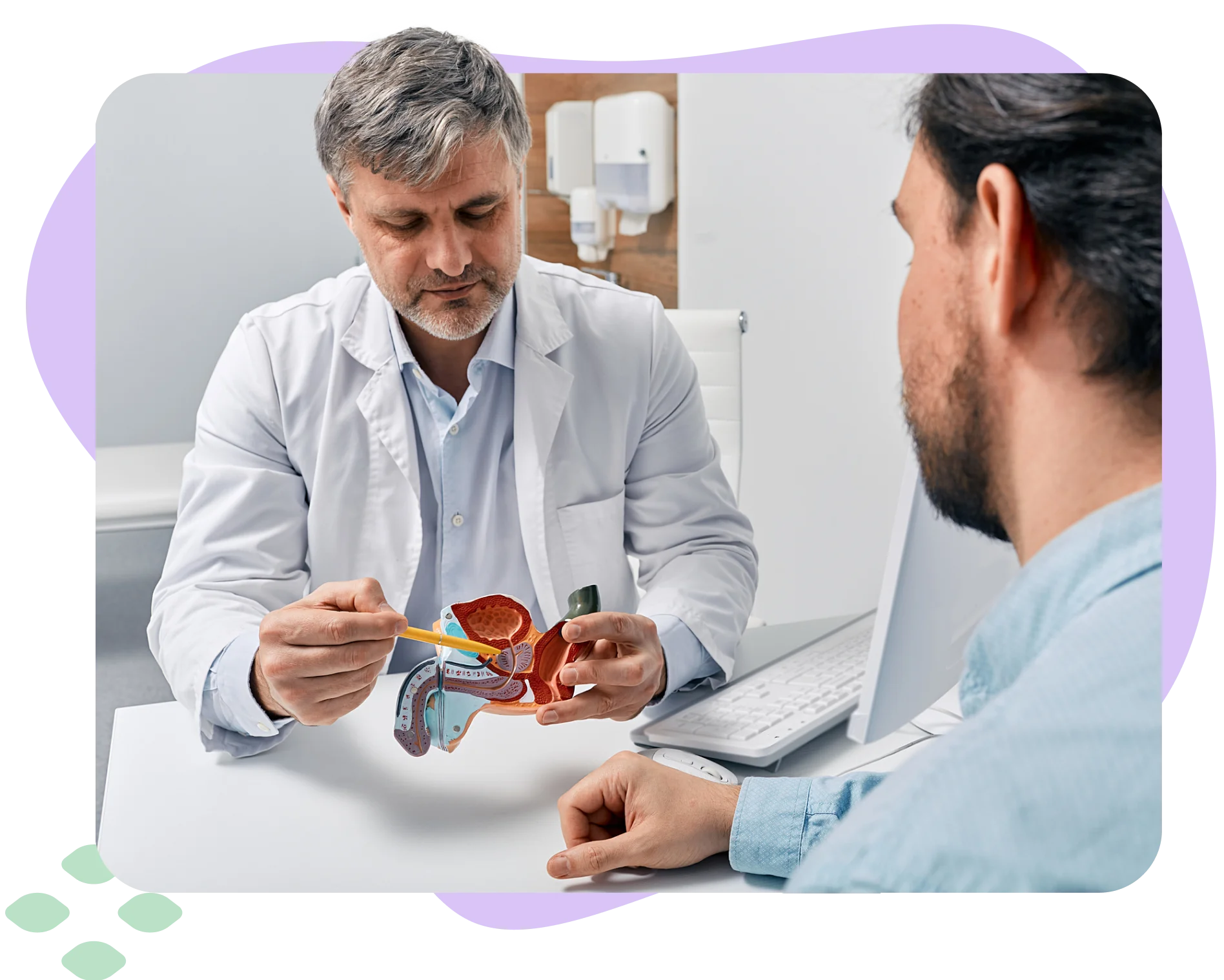What is erectile dysfunction?
Erectile dysfunction (ED), also known as impotence, is a medical condition where a man is unable to have an erection or maintain an erection long enough for sexual activity. ED is a common condition that affects men’s sexual health. It impacts your ability to have a fulfilling sexual life and causes a lot of problems with your self-esteem, relationships with others, and the overall quality of your life. If you’re having difficulties achieving or maintaining an erection long enough for satisfactory sexual performance, you may be experiencing ED.
Who gets erectile dysfunction?
ED tends to be more common in men over 40 and people with certain health conditions, but this does not mean every man will experience ED as they get older. It is estimated that half of men over the age of 40 experience ED in the UK. Research studies estimate that globally there are 150 million men impacted by ED, and this number is probably higher because many men do not discuss their ED symptoms with their doctor out of shame or embarrassment.

Causes of erectile dysfuncion
Different factors can cause ED, and these often involve a combination of physical and psychological causes. Physical factors are certain health conditions or lifestyle factors, and contribute about 90% of all ED cases, and include:
- Cardiovascular disease (heart disease), including high blood pressure
- Diabetes
- Hormonal imbalances
- Neurological disorders
- Certain anatomical abnormalities
- Obesity
- High cholesterol
- Drug abuse
In addition to the physical causes of ED, research studies have also shown that there is also a mental or psychological component to ED. These psychological factors, including stress, depression, and anxiety, can occur together with the physical causes of ED but only 10% of ED cases are caused by only psychological factors alone.
Symptoms of erectile dysfunction
The primary symptoms of erectile dysfunction are:
- Trouble getting an erection during sexual activity (you may have no trouble getting an erections at other times such as when you wake up)
- Trouble Maintaining an erection
- Reduced sexual desire (low libido)
- Psychological distress or embarrassment due to sexual performance issues
Erectile dysfunction diagnosis
To diagnose ED, your doctor will take a detailed medical and sexual history, conduct a physical examination, and may perform additional tests. They will discuss your sexual experiences in detail to understand possible causes of your ED. They will also ask about different aspects of your life, such as your job, stress levels, smoking habits, exercise routine, diet, and alcohol or drug use.
It’s also important for your doctor to know about your sex drive, whether you still have erections at night or in the morning, and if your partner is concerned or if your relationship is being affected. These pieces of information will help your doctor come up with the best individualised plan for you.
Your doctor may also order additional tests, such as blood and urine tests, to check your kidneys, liver, cholesterol levels, blood sugar levels, and hormone levels.
In some cases, a urology specialist may order more specific tests. It is important to be aware that a physical examination may reveal signs of other underlying health problems, such as heart disease or diabetes, that could be contributing to your ED. Your doctor may assess your penis and testicles, check your blood pressure, and examine other physical features.
Treatment & management of erectile dysfunction
Treating ED is an individual approach that you and your doctor will discuss to try to treat the underlying cause, the severity of the condition, your overall health, and your preferences, as well as the input of your partner. Making lifestyle modifications is often the first step in managing ED. This means you start to adjust certain lifestyle factors that can help with ED, such as, eating a healthy diet, reducing alcohol intake, losing weight, increasing exercise, and quitting smoking.
Also, if you do have some of the other physical conditions, such as obesity, diabetes, or high cholesterol, beginning to ensure these factors are also controlled will be helpful for your ED. If one of the causes of your ED is psychological, then beginning psychotherapy or mental health therapy with a professional is also recommended.
After all of the lifestyle changes are discussed and addressed, the main treatment option for ED is medication.
Medications for erectile dysfunction
Commonly prescribed medications belong to a class of drugs called phosphodiesterase 5 inhibitors (PDE5 inhibitors). These include sildenafil (Viagra), tadalafil (Cialis), vardenafil (Levitra), and avanafil (Spedra). All of these medications work in a similar way by increasing blood flow to your penis, helping you have and maintain an erection.
Sildenafil (Viagra)
This medication is available by prescription or over the counter at pharmacies. It increases blood flow to the penis, enabling a satisfactory erection. You should consult a pharmacist before using it. The typical starting dose is 50 mg, which can be increased or decreased based on your response and needs. You usually take it about 30 to 60 minutes before sexual activity, and it can last for up to four hours. Remember not to take Sildenafil (Viagra) more than once a day and if you have an erection lasting more than 4 hours you should visit the emergency department because this can be unsafe for your penis. Sildenafil (Viagra) should not be taken at the same time as grapefruit juice because it can increase the effect of the medications.
Tadalafil (Cialis)
This medication works the same way as sildenafil (Viagra). It can be obtained only with a prescription, and not over the counter. The starting dose can be 2.5 to 5 mg taken once daily. Depending on your response, the dose can be increased to 10 or 20 mg or decreased if it is too much. Tadalafil (Cialis) can be effective for up to 36 hours, especially if your doctor starts you on a smaller daily dose. This can help with morning erections as well. Follow the instructions provided by your doctor or the package leaflet. Like sildenafil (Viagra), tadalafil (Cialis) should not be taken at the same time as grapefruit juice.
Are erectile dysfunction medicines safe?
While these medications are generally safe, there can be a few side effects. Most people (97%) do not stop taking the medication because of bad side effects.
Side effects of erectile dysfunction medicines
- Headaches
- Flushing
- Indigestion (stomach pain)
- Nasal congestion
- Dizziness
Remember that while these medications can help manage erectile dysfunction, they do not cure the underlying cause. They should be used alongside lifestyle changes and under the guidance of your pharmacist or doctor. Other treatment options for ED include penile injections, vacuum erection devices, and penile implants. These are not commonly used as a first-treatment option and are saved for more complicated cases or if you are unable to take the oral ED medications.
Erectile dysfunction drug interactions
Speak with your pharmacist when you first pick up your ED medication because there are some very important drug interactions to avoid. For example, ED medications shouldn’t be used by people who take other nitrate drugs (GTN spray, isosorbide, or amyl nitrate) for angina, heart disease, or other reasons.
Mixing these types of medications can cause a dangerous drop in your blood pressure. They should also be used with caution in men who have heart conditions, uncontrolled high or low blood pressure, or who have had a recent stroke or heart attack. Check with your pharmacist, and remember to always refer to the patient information leaflet for more information about any medication you plan to use.
Conclusion
In conclusion, ED is a common condition that can greatly impact your quality of life. However, with a proper understanding of the condition, its causes, and available treatments, you can lead a satisfying sexual life. If you’re experiencing symptoms of ED, consult with a doctor or pharmacist for a proper diagnosis and guidance toward the most effective treatment options.
FAQ
Is erectile dysfunction a normal part of aging?
While your chance of ED increases with age, it is not an inevitable part of the aging process. Many men maintain their erectile function well into their older years. If you’re experiencing ED, it’s important to visit your doctor, as it could be a sign of an underlying health condition that requires treatment.
Can lifestyle changes really help manage erectile dysfunction?
Yes, lifestyle modifications can have a significant impact on managing ED. Regular exercise, a balanced diet, maintaining a healthy weight, refraining from excessive alcohol consumption, and quitting smoking can all improve erectile function. These changes can also help manage or prevent conditions associated with ED, such as heart disease and diabetes.
Are medications for erectile dysfunction safe?
Yes, when prescribed by a doctor or pharmacist, ED medications are generally safe. However, they can cause side effects and may not be suitable for everyone. Men taking nitrates for heart disease, for example, should not use these medications.
References
- Li JZ, Maguire TA, Zou KH, Lee LJ, Donde SS, Taylor DG. Prevalence, Comorbidities, and Risk Factors of Erectile Dysfunction: Results from a Prospective Real-World Study in the United Kingdom.Int J Clin Pract. 2022;2022:5229702. doi:10.1155/2022/5229702. https://pubmed.ncbi.nlm.nih.gov/35693549/
- T S, SW L. Erectile Dysfunction. [Updated 2022 Nov 28]. In: StatPearls [Internet]. Treasure Island (FL): StatPearls Publishing. January, 2023. Accessed 05/10/23. https://www.ncbi.nlm.nih.gov/books/NBK562253/
- The British Association of Urological Surgeons. Erectile Dysfunction (impotence). Accessed 5/10/23. https://www.baus.org.uk/patients/conditions/3/erectile_dysfunction_impotence/
- National Health Service (NHS). Erectile Dysfunction (impotence). February 10, 2023. Accessed 5/10/23. https://www.nhs.uk/conditions/erection-problems-erectile-dysfunction/
- National Health Service (NHS). Tadalafil. Accessed 5/10/23. https://www.nhs.uk/medicines/tadalafil/
- National Health Service (NHS). Sildenafil (Viagra). Accessed 5/10/23. https://www.nhs.uk/medicines/sildenafil-viagra/



















